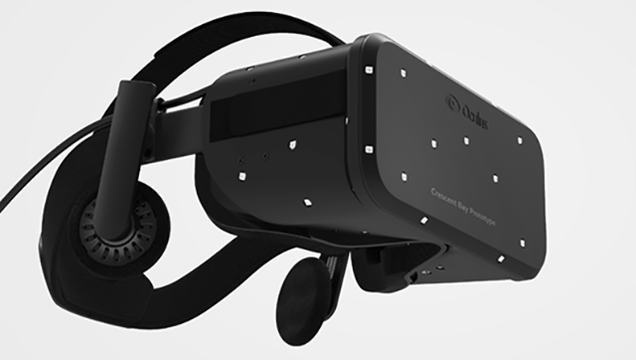I'm absolutely happy to see my month and a half old hardware is already prototype obsolete. This new stuff was all announced at Oculus' developer event, Oculus Connect. We know Crescent Bay is 90Hz (DK2 is 75Hz, Morpheus 60Hz). It's suspected Crescent Bay is also 1440p (DK2, Morpheus 1080p). The field-of-view is supposedly increased drastically beyond DK2 (bringing it more in like with DK1/Morpheus or more). Not many details are known about the lenses, but they are asymmetrical, not circular. DK2 has a yucky true black smearing effect, I have not heard reports of it returning in the Crescent Bay screen. The 360 degree positional tracking is achieved viewing IR LED's on the front visor, and now a back plate behind the head. Their headphones are optional, though Palmer insists these current ones are "more than just decent". It is unknown if they are built to better facilitate 3D audio or not. Oculus also plans to include a microphone with the unit, probably with the intention of building social VR experiences (enter Facebook).
As for whether Morpheus will keep up, I don't know. If Oculus already expects users to run VR in 1440p at 90Hz, Sony has their work cut out for them in providing compelling experiences that run with such performance on the PS4. If so, we may see a return to PS3-like visuals. Not necessarily a terrible thing.
Last week Nvidia announced their new line of graphics cards (GTX 900 series) has optimizations made specifically for VR rendering (they were relatively light on details), and rumors are circulating that AMD is gearing to announce similar features this Thursday (25th). VR will definitely be a field that involves serious horse power. Oculus will have to work very hard to inform people who are wowed by future store demos that they must have something better than an office PC to drive it. Hopefully in mid/late 2015 when I expect this thing to release that kind of performance will be obtainable in the 200 dollar range. Nvidia's GTX970 is already a performance monster at a (relatively) tame $350.
To mitigate some of these super high performance requirements, Oculus discussed quite a bit about what they are working on. Carmack's Time Warp (
https://www.youtube.com/watch?v=WvtEXMlQQtI) technology is expected to be implemented into all VR experiences to allow some lower framerate experiences to still be comfortable. They have plenty more interesting stuff to talk about on the software optimization side that went either above my head, or I can't explain appropriately while this tired, but it's definitely good stuff.
I'm excited.


